七年级英语下册知识点总结(完整-详细)
七年级下册英语知识点复习完整版
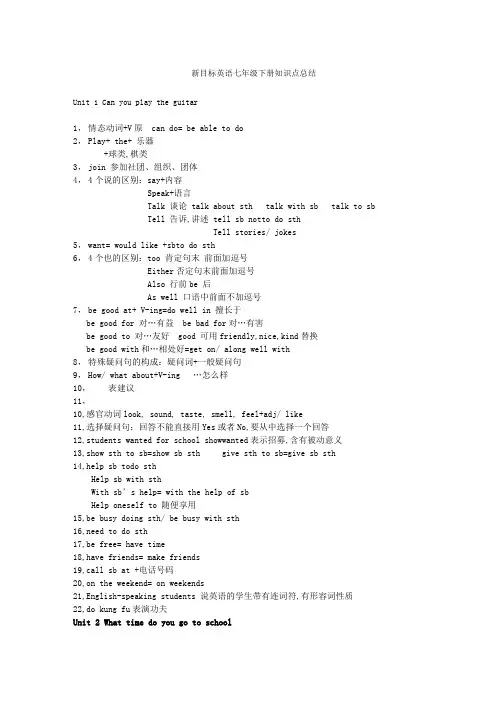
新目标英语七年级下册知识点总结Unit 1 Can you play the guitar1,情态动词+V原 can do= be able to do2,Play+ the+ 乐器+球类,棋类3,join 参加社团、组织、团体4,4个说的区别:say+内容Speak+语言Talk 谈论 talk about sth talk with sb talk to sb Tell 告诉,讲述 tell sb notto do sthTell stories/ jokes5,want= would like +sbto do sth6,4个也的区别:too 肯定句末前面加逗号Either否定句末前面加逗号Also 行前be 后As well 口语中前面不加逗号7,be good at+ V-ing=do well in 擅长于be good for 对…有益 be bad for对…有害be good to 对…友好 good 可用friendly,nice,kind替换be good with和…相处好=get on/ along well with8,特殊疑问句的构成:疑问词+一般疑问句9,How/ what about+V-ing …怎么样10,表建议11,10,感官动词look, sound, taste, smell, feel+adj/ like11,选择疑问句:回答不能直接用Yes或者No,要从中选择一个回答12,students wanted for school showwanted表示招募,含有被动意义13,show sth to sb=show sb sth give sth to sb=give sb sth14,help sb todo sthHelp sb with sthWith sb’s help= with the help of sbHelp oneself to 随便享用15,be busy doing sth/ be busy with sth16,need to do sth17,be free= have time18,have friends= make friends19,call sb at +电话号码20,on the weekend= on weekends21,English-speaking students 说英语的学生带有连词符,有形容词性质22,do kung fu表演功夫Unit 2 What time do you go to school1,问时间用what time或者whenAt+钟点 at 7 o’clock at noon/ at nightduring/ in the dayOn+ 具体某天、星期、特指的一天 on April 1st on Sunday on a cold winter morningIn +年、月、上午、下午、晚上2,时间读法:顺读法逆读法:分钟≤30用past five past eight8:05 half past eight8:30分钟>30用to a quarter to ten9:45整点用…o’clock 7 o’clock7:003,3个穿的区别:wear 表状态,接服装、手套、眼镜、香水等Put on 表动作,接服装Dress 表动作,接sb/ oneself get dressed穿衣3,感叹句:How+adj+主谓How+adj+a/an +n单+主谓What+ a/an +adj+ n单+主谓What+ adj+ n复/ 不可数+主谓4,from…to…5,be/ arrive late for6,频度副词行前be 后Always usually often sometimes seldom hardly never7,一段时间前面要用介词for for half an hour for five minutes8,eat/ have… for breakfast/ lunch/ dinner/ supper9,either…or10,a lot of=lots of11,it is +adj+for sb +to do sth adj修饰to do sthIt is important for me to learn English.it is +adj+of sb +to do sth adj修饰sb It is kind/ friendly/ nice of you to help me.Unit 3 How do you get to school1,疑问词How 如何方式how long 多长时间答语常用“For/ about +时间段”how far多远距离答语常用“It’s +数词 +miles/ meters/ kilometers”how often多久一次频率答语常用“Always/ often/ every day/…”或“次数+时间”等表频率的状语How soon多快,多久以后,常用在将来时中;答语常用“in +时间段”how many多少接可数名词 how much接不可数名词why为什么原因 what什么 when何时who谁 whom谁宾格针对宾语提问也可用who whose谁的2,宾语从句要用陈述句语序3,Stop sb from doing sthStop to do 停下来去做其他事Stop doing 停止正在做的事4,what do you think of/ about…= how do you like…你认为…怎么样5,6,He is 11 years old.He is an 11-year-old boy.7,many students= many of the students8,be afraid of sth be afraid to do sth worry about be worried about 担心9,play with sb10,come true10,have to do sth11,he is like a father to me like像12,leave离开 leave for 出发前往某地13,cross 是动词 across是介词14,thanks for +n/ V-ingThanks for your help/ thanks for helping me.Thanks for your invitation/ thanks for inviting/ asking me.Thanks to幸亏,由于,因为15,4个花费:人+spend/ spends/ spent+时间/钱+indoing sth/ on sth人+pay/ pays/ paid +钱+for sthIt takes/ took sb +时间+to do sth物+cost/ costs/ cost +sb +钱16,交通方式●用介词;在句子中做方式状语;①by +交通工具名词中间无需任何修饰By bus/ bike/ car/ taxi/ ship/ boat/ plane/ subway/ train……②by +交通路线的位置By land/ water/ sea/ air③in/ on +冠词/物主代词/指示代词 +交通工具名词In a/ his/ the carOn a/ his/ the bus/ bike/ship/ train/ horse/ motorbike④on foot 步行●用动词;在句子中做谓语;①take + a/ the +交通工具名词take a bus/ plane/ ship/ trainride a bike②walk/ drive/ ride/ fly to……后面接here,there,home等地点副词时,省略介词to;如步行回家:walk home17,名词所有格一般情况加’s Tom’s pen以s结尾加’ the teachers’ office ten days’ holiday表示几个人共同拥有,在最后一个名词后加’s Mike and John’s desk表示每个人各自拥有,在每个名词后加’s Mike’s and John’s desksUnit 4 Don’t eat in class.1,祈使句变否定在句首+don’tBe型be +表语,否定形式:don’t + be +表语 Be quiet,please. Don’t be late Do型实义动词+其他,否定形式:don’t +实义动词+其他Come here,please. Don’t play football here.Let型let sb do sth,否定形式:don’t + let sb do sth或者let sb not do sthNo+n/ V-ing No photos /mobile;No parking/ smoking/ spitting/ talking/ picking of flowers2,in class在课堂上 in the classroom 在教室3,be on time准时4,listen to music5,have afight with sb7,eat outside8,Must 与have to1must 表示说话人主观上的看法,意为“必须”; have to 表示客观的需要或责任,意为“不得不,必须”,后接动词原词;2must没有人称,时态和数的变化Have to 有人称,数,时态的变化,其第三人称单数形式为 has to ,过去式为had to. 构成否定句或疑问句时借助动词do/ does;3have to的否定式是needn’t=don’t/ doesn’t have to 不必要;must的否定式是must not/ mustn’t一定不能,不允许;9,Some of…10,bring…to…11,practice doingsth12,wash/ do the dishes13,on school days/ nights14,break/ followobeythe rules15,Be strict with sb/ oneself be strict in sth对……严格;16,too many“太多”修饰可数名词复数too much“太多”修饰不可数名词much too“实在太”修饰形容词或副词17,make one’s/ the bed18,get to, arrive in/at, reach,到达如果后面接地点的副词home,here或there ,就不用介词in ,at, to19,remember/ forget+to do要做+doing做过20,have fun,enjoy oneself,have a good/ great/ wonderful time+V-ingUnit 5 Why do you like pandas1,回答why的提问要用because2,Kind of 相当于副词,修饰形容词或副词,意为“稍微,有点”,与a little/ bit 相近A kind of 意为“一种”,some kinds of 意为“几种”,all kinds of 意为“各种各样的”;这里的kind 是“种,类,属”的意思;3,Why not =Why don’t you+V原你为什么不…4,walk on one’s legs/ hands on 意为“用…方式行走”5,all day =the whole day整天6,来自be/ come from where do they come from=where are they from7,more than=over超过 less than 少于8,once twice three times9,be in great danger10,one of……之一 +名词复数11,get lost12,with/ without 有/ 没有介词13,a symbol of14,由…制造 be made of能看出原材料be made from 看不出原材料be made in+地点表产地15,cut down 砍到动副结构代词必须放中间,名词可放中间或者后面Unit 6 I’m watching TV.1,现在进行时其结构为be的现在式am, is, are+ 现在分词V-ing;否定形式在be后面加not,疑问式将be动词提前2,动词-ing形式的构成:一般情况+ing;以不发音的e结尾的,去e加ing;重读闭音节结尾,末尾只有一个辅音字母,双写辅音字母再加ing3,go to the movies4,join sb for sth与某人一起做某事 join us for dinner5,live with sb live in+地点6,other,another与the otherOther “其他的,另外的”,后接名词复数,有时other+n复数=othersAnother “又一个,另一个”,泛指总数为三个或三个以上中的任意一个,后接名词单数;The other“两者中的另一个”,常与one连用,“one…the other…”表示“一个…,另一个…”7,talk on the phone8,wish to do sth9,Here is+ n单 Here are+ n 复Unit 7 It’s raining1.询问天气的表达方式:How’s the weather It’s a raining/sunny day. It’s raining.What’s the weather like It’s windy.2,play computer games3,How’s it/ everything going=How have you been4,5,In/ at the park6,Take a message for sb 替人留言Leave a message to sb 给人留言7,call sb back8,right now,right away,at once,in a minute,in a moment,in no time 立刻,马上9,right now现在 just now刚刚用于一般过去式10,over and over again10,the answer to the question,a key to the door,a ticket to the ball game11,by the pool12,summer vacation13,go on a vacation去度假 be on a vacation在度假14,write a letterto sb15,反意疑问句陈述句+附加疑问句反意疑问句中,陈述句用的肯定,后面的附加疑问句就要用否定;相反,陈述句用的否定,附加疑问句就要用肯定;16,adj 以-ing结尾“令人…的”exciting,interesting,relaxing以-ed结尾“人感到…的”excited,interested,relaxed17,in the first picture18,dry干燥的 humid潮湿的Unit 8 Is there a post office near here1,There is +单数可数名词/不可数名词+ 地点状语.There are +复数名词+地点状语.谓语动词要与跟它最近的那个名词一致就近原则;There be句型的否定式在be后加上not或no即可;注意not和no的不同:not是副词,no 为形容词,not a/an/any + n. 相当于no+ n.There be句型的一般疑问句变化是把be动词调整到句首There be表示“某处存在某物或某人”;have表示“某人拥有某物/某人”2,问路:①Is/ Are there……near here/ around here/ in the neighborhood②Where is/ are……③How can I get to……④Could/Can you tell me the way to……⑤Which is the way to……3,Across,cross,through,overAcross是介词,“横过,在对面”表示从物体表面穿过Cross是动词,相当于go/ walk acrossThrough是介词,表示从物体中间或里面穿过 go through the doorOver是介词,“横过,越过”表示从物体上空越过,跨过 fly over4,ask for help/ advice5,in/ on the street6,在某条大街上习惯用介词on on Bridge Street7,across from,next to,between…and…,behind8,in front of在…外部的前面→behind在…后面 in the front of在…内部的前面9,be in town→be out of town10,be far from11,go/ walk along go straight go up/ down12,turn left/right13,on one’s/ the left14,at the first crossing/ turning15,sometimes 有时频度副词 sometime将来有朝一日,曾经某天Some times 几次,几倍 some time 一段时间前面用介词for16,free 空闲的 free time自由的 as free as a fish免费的 The best things in life are free.17,enjoy doing18,Time goes quickly.19,表“一些”在肯定句中用some. 在疑问句和否定句中用any;特殊用法:some可用于表示盼望得到对方肯定的答复或表示建议、委婉请求的疑问句中;any也可用于肯定句中,表示"任何的";Unit 9 What does he look like1,what does he look like 询问人长什么样,回答:①主语+be+形容词/ 介词短语he is tall/ of medium height;②主语+have/has+形容词+名词she has long hairwhat does sb like 询问某人喜欢什么2,多个形容词修饰名词多个形容词修饰名词,一般关系近的靠近名词;音节少的在前,音节多的在后;限定词+数词序前基后+描绘性形容词+大小、长短、高低+新旧+颜色+国籍+材料+名词3,May be 为情态动词+动词原形,在句子中做谓语,maybe是副词,表示可能,大概,一般放在句首;4,a little,little修饰不可数名词,a little表示一点点,little表示几乎没有a few,few修饰可数名词,a few表示一点点,few表示几乎没有5, Find 强调找到的结果,look for 强调寻找的过程.6,问职业:what do you do=what is your job7,the same as→be different8,long straight brown hair9,最后in the end表事情结局finally强调次序at last强调经多番努力终于达成By the end of 直到……为止At the end of在……末端/尽头Unit 10 I’d like some noodles.1,名词可分为可数名词和不可数名词不可数名词作主语,谓语动词用单数;可数名词又分单数和复数;错误!一般+s;错误!以-s,-x,-ch,sh结尾的名词+es;错误!辅音+y,把y变i,再+es;错误!以-o结尾的,有生命的+es negro—negroes;hero—heroes;tomato—tomatoes;potato—potatoes;无生命的+s;⑤以f,fe 结尾的名词,改f,fe为v+es leaf—leaves;knife—knives例外:roofs,chiefs⑥单复数同形:sheep,deer.不规则变化:man—men;woman—women;child—children;foot—feet;tooth—teeth等2,would like sth. 想要某物Would you like some …你想要一些……吗——Yes, please./ ——No, thanks.would like to do sth. “想要做某事”;Would you like to … 你愿意去做……吗—Yes, I’d like / love to./—I’d like/ love to. But I’m too busy.would like sb to do sth “想要某人做某事”;3,order:order food take/ have one’s orderIn order to为了In the order按顺序Order/ book a room 预定房间Order sbnotto do sth命令4,special和especialSpecial特别的人或事物,特别的,特殊的,specials特色菜;specially专门地,特地Especial特别的,突出的,especially特别,尤其5, the number of表示“……的数量”,后面接可数名词复数;做主语时,主语是number而不是of后面的名词复数,因此谓语动词要用单数;a number of表示“许多”,相当于many, 后面接可数名词复数,做主语时,主语不是number 而是of后面的名词复数,因此谓语动词要用复数;Number前可用large,great,small修饰,不能用little;6,仍然,还:still肯定句Yet疑问句、否定句7,one bowl of two bowls of8,what size+nwould you like Large/ medium/ small9,what kind of10,大:big 体格大、笨重→small,little 形容具体的人或物Huge物体体积巨大=very bigLarge物体面积、空间、范围、数量大→small 不修饰人Great重大事件或行为,伟大,具有感情色彩11,肯定句中表并列用and 否定句、疑问句中表并列用or12,around the world= all over the world13,make a wish 14,blow out15,in/ at one go 16,get popular17,cut up动副结构18,bring good luck to19,different kinds of20,be short of缺乏Unit 11 How was your school trip1,一般过去时基本结构:主语+动词过去式+其他;否定形式:①was / were + not; ②在行为动词前加didn't,同时还原动词;一般疑问句:①Was/Were+主语+其他②Did+主语+动词原形+其他2,动词过去式规则变化:直接加ed;以不发音e结尾的单词,直接加d;以辅音字母+y结尾的,变y为i加ed;以元音字母+y结尾的,直接加ed;以重读闭音节结尾的,双写最后的辅音字母+ed不规则变化的动词过去式见书本最后一页3,How was your school trip = what was your school trip like4,Go for a walk5,Milk a cow6,Ride a horse7,Quite a lot8,Show sb around9,并列谓语的时态和数必须一致;10,In the countryside11,after that12,come out13,go on school trip14,along the way15,buy/ get sb sth= buy/ get sth for sb16,all in all17,否定转移主语为第一人称I 或者we时think,believe,suppose18,be interested in +n/ v-ing19,not at all20,diary entry21,Something意为“某事,有些事”;anything意为“任何事,任何东西”;everything意为“每一件事”其后的谓语动词要用单数;nothing意为“没事,什么事都没有”;Unit 12 What did you do last weekend1,go+V-ing与do some +V-inggo+V-ing表示“去从事某种活动”一般指户外go shopping/ swimming/ skating/ dancing/ skiing/ climbing/ camping/ hiking……do some +V-ing 表示“从事某种活动”一般指室内do some writing/ washing/ cooking/ cleaning/ reading……2,go to the cinema3,camp by the lake4,study for a test study for the English test5,work as a guide6,living habits7,stay up late8,shout at sb 因生气或愤怒向某人吼叫;shout to sb 对某人大声叫喊,目的是让人听见9,run away10,fly a kite11,adj修饰不定代词 adj要放后面 something important,anything interesting12,take sb to…带某人去……13,put up tents14,make a fire15,on the first night16,each other17,get a terrible surprise18,finish doing19,look out of…从……朝外看window,door……look out at sth 向外眺望……look out for 留神、注意、小心、关心20,feel/ watch/ see/ hear sb do sth强调整个过程feel/ watch/ see/ hear sb doing sth强调动作正在进行21,jump up and down22,wake up23,so +adj +that +结果状语从句“如此……以致……”eg:I was so busy that I didn’t go to sleep for 3 days.The weather was so cold that they had to stay at home.The coat is so expensive that I don’t want to buy it.so that 引导目的状语从句,以便,为了in order toeg:they got up early so that they could catch the early bus.I raise my voice so that I can make myself heard.。
人教版初中英语七年级下册知识点总结
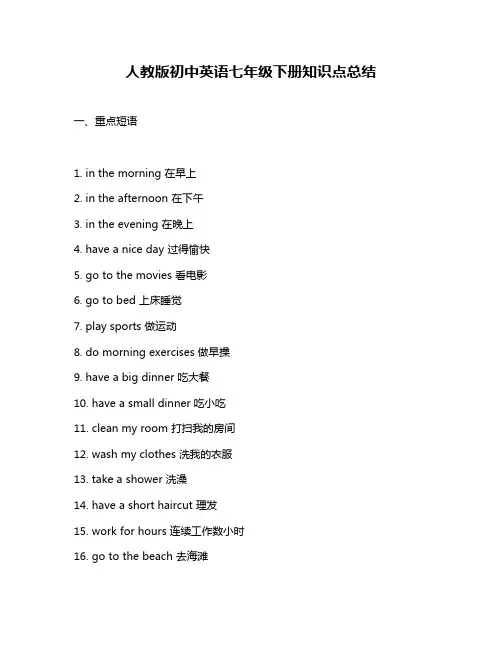
人教版初中英语七年级下册知识点总结一、重点短语1. in the morning 在早上2. in the afternoon 在下午3. in the evening 在晚上4. have a nice day 过得愉快5. go to the movies 看电影6. go to bed 上床睡觉7. play sports 做运动8. do morning exercises 做早操9. have a big dinner 吃大餐10. have a small dinner 吃小吃11. clean my room 打扫我的房间12. wash my clothes 洗我的衣服13. take a shower 洗澡14. have a short haircut 理发15. work for hours 连续工作数小时16. go to the beach 去海滩17. on the weekend 在周末18. listen to music 听音乐19. have a party 举办聚会20. watch TV 看电视21. play computer games 玩电脑游戏22. in the pool 在游泳池里23. go to the zoo 去动物园24. in the mountains 在山里25. have fun 玩得开心26. the great wall 长城27. many places of interest 名胜古迹28. be ready for 为……准备好29. stay healthy 保持健康30. how much 多少31. would you like 一些……吗?32. some noodles 一些面条33. order a pizza 定一个披萨饼34. make a phone order 电话订购35. would you like to do sth 你愿意做某事吗?36. want to do sth 想做某事37. would you like +名词你愿意要……吗?38. would you like +动词不定式你愿意……吗?39. choose some food 选择一些食物40. order the food 订购食物41. be careful 当心;小心42. not much 不多;少量的43. be ready to do sth 准备好做某事。
最全初一(七年级)英语下册语法知识归纳总结
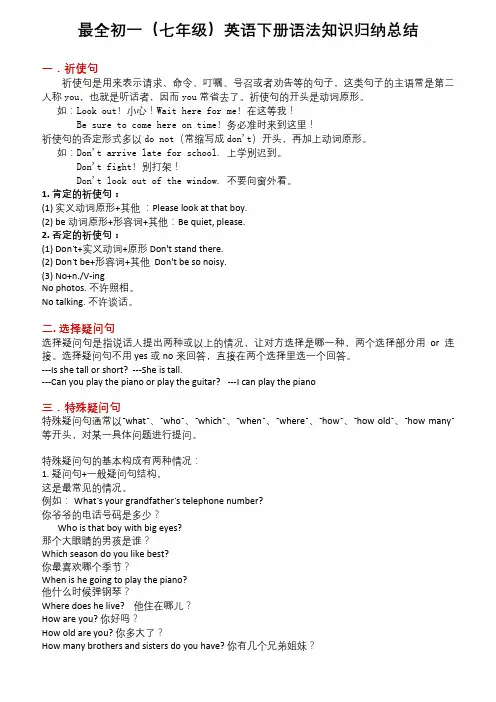
最全初一(七年级)英语下册语法知识归纳总结一.祈使句祈使句是用来表示请求、命令、叮嘱、号召或者劝告等的句子,这类句子的主语常是第二人称you,也就是听话者,因而you常省去了。
祈使句的开头是动词原形。
如:Look out! 小心!Wait here for me! 在这等我!Be sure to come here on time! 务必准时来到这里!祈使句的否定形式多以do not(常缩写成don't)开头,再加上动词原形。
如:Don't arrive late for school. 上学别迟到。
Don't fight! 别打架!Don't look out of the window. 不要向窗外看。
1. 肯定的祈使句:(1) 实义动词原形+其他:Please look at that boy.(2) be动词原形+形容词+其他:Be quiet, please.2. 否定的祈使句:(1) Don’t+实义动词+原形 Don't stand there.(2) Don’t be+形容词+其他 Don't be so noisy.(3) No+n./V-ingNo photos. 不许照相。
No talking. 不许谈话。
二. 选择疑问句选择疑问句是指说话人提出两种或以上的情况,让对方选择是哪一种,两个选择部分用or连接。
选择疑问句不用yes或no来回答,直接在两个选择里选一个回答。
---Is she tall or short? ---She is tall.---Can you play the piano or play the guitar? ---I can play the piano三.特殊疑问句特殊疑问句通常以“what”、“who”、“which”、“when”、“where”、“how”、“how old”、“how many”等开头,对某一具体问题进行提问。
七年级下册英语语法知识点归纳总结
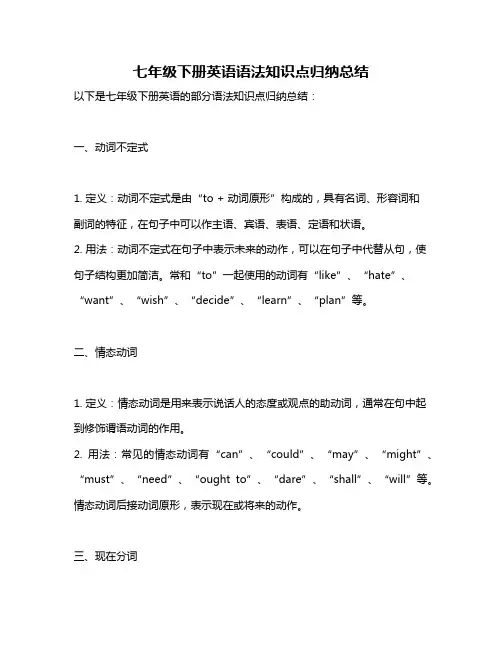
七年级下册英语语法知识点归纳总结以下是七年级下册英语的部分语法知识点归纳总结:一、动词不定式1. 定义:动词不定式是由“to + 动词原形”构成的,具有名词、形容词和副词的特征,在句子中可以作主语、宾语、表语、定语和状语。
2. 用法:动词不定式在句子中表示未来的动作,可以在句子中代替从句,使句子结构更加简洁。
常和“to”一起使用的动词有“like”、“hate”、“want”、“wish”、“decide”、“learn”、“plan”等。
二、情态动词1. 定义:情态动词是用来表示说话人的态度或观点的助动词,通常在句中起到修饰谓语动词的作用。
2. 用法:常见的情态动词有“can”、“could”、“may”、“might”、“must”、“need”、“ought to”、“dare”、“shall”、“will”等。
情态动词后接动词原形,表示现在或将来的动作。
三、现在分词1. 定义:现在分词是动词的一种形式,具有形容词的特征,可以表示正在进行的动作或状态。
2. 用法:现在分词可以作定语、表语和状语。
常和“-ing”一起使用的动词有“seeing”、“feeling”、“thinking”、“doing”、“being”等。
四、介词短语1. 定义:介词短语是由介词和名词或代词构成的短语,用来表示时间、地点、方式等。
2. 用法:介词短语在句子中可以作状语、定语和表语。
常见的介词有“in”、“on”、“at”、“for”、“with”、“by”等。
五、连词1. 定义:连词是用来连接两个句子或从句的词语,表示它们之间的关系。
2. 用法:常见的连词有“and”、“but”、“or”、“so”、“because”、“if”等。
连词在句子中起到承上启下的作用,使句子的意思更加清晰。
以上是七年级下册英语的部分语法知识点归纳总结,希望对你有所帮助。
七年级下册英语知识点整理
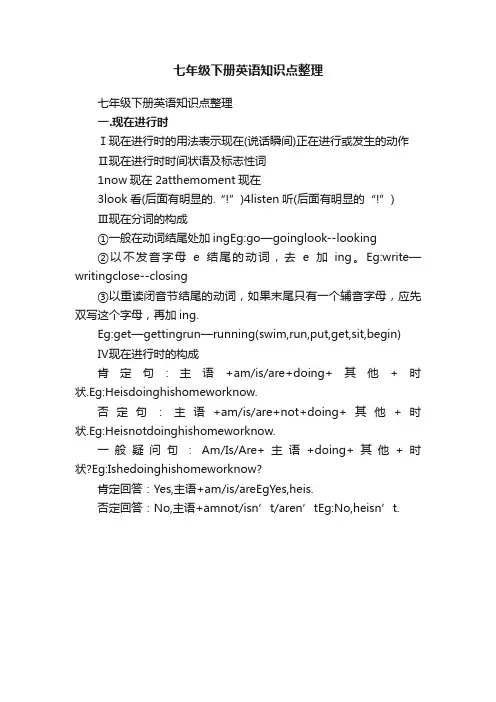
七年级下册英语知识点整理
七年级下册英语知识点整理
一.现在进行时
Ⅰ现在进行时的用法表示现在(说话瞬间)正在进行或发生的动作
Ⅱ现在进行时时间状语及标志性词
1now现在2atthemoment现在
3look看(后面有明显的.“!”)4listen听(后面有明显的“!”)
Ⅲ现在分词的构成
①一般在动词结尾处加ingEg:go—goinglook--looking
②以不发音字母e结尾的动词,去e加ing。
Eg:write—writingclose--closing
③以重读闭音节结尾的动词,如果末尾只有一个辅音字母,应先双写这个字母,再加ing.
Eg:get—gettingrun—running(swim,run,put,get,sit,begin)
Ⅳ现在进行时的构成
肯定句:主语+am/is/are+doing+其他+时状.Eg:Heisdoinghishomeworknow.
否定句:主语+am/is/are+not+doing+其他+时状.Eg:Heisnotdoinghishomeworknow.
一般疑问句:Am/Is/Are+主语+doing+其他+时状?Eg:Ishedoinghishomeworknow?
肯定回答:Yes,主语+am/is/areEgYes,heis.
否定回答:No,主语+amnot/isn’t/aren’tEg:No,heisn’t.。
人教版七年级英语下册单元知识点总结(全册)
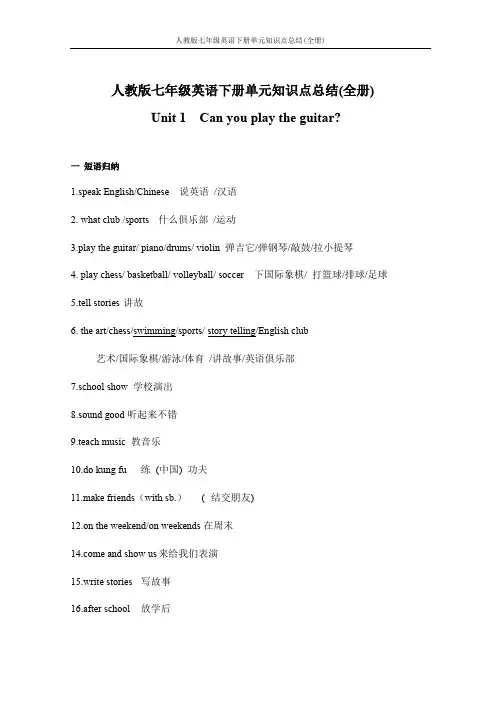
人教版七年级英语下册单元知识点总结(全册)Unit 1 Can you play the guitar?一短语归纳1.speak English/Chinese 说英语/汉语2. what club /sports什么俱乐部/运动3.play the guitar/ piano/drums/ violin 弹吉它/弹钢琴/敲鼓/拉小提琴4. play chess/ basketball/ volleyball/ soccer 下国际象棋/ 打篮球/排球/足球5.tell stories讲故6. the art/chess/swimming/sports/ story telling/English club艺术/国际象棋/游泳/体育/讲故事/英语俱乐部7.school show 学校演出8.sound good听起来不错9.teach music 教音乐10.do kung fu练(中国) 功夫11.make friends(with sb.)(结交朋友)12.on the weekend/on weekends在周末e and show us来给我们表演15.write stories写故事16.after school放学后17.English-speaking students说英语的学生18.play games 做游戏19.the Students’ Sports Center学生运动中心20.at the old people’s home在老人之家21.be in our school music festival 参加学校音乐节22.jion the music club加入音乐俱乐部二用法集萃1. play +棋类/球类下……棋,打……球2. play the +乐器弹/拉……乐器3. be good at doing sth.擅长做某事be good for.. 对… 有好处be good /kind to … 对… 友好4. be good with sb. 和某人相处地好; 善于应付(处理)…5. need(sb./sth.)to do… 需要(某人/某物)做….6. can + 动词原形能/会做某事7. a little + 不可数名词: 一点儿……9. like to do sth.或like doing sth. 喜欢做某事10.want to do…想做……11.What about…?…怎么样?(后面接Ving/代词/名词)12. talk用法: talk to/with sb. 跟某人说话talk about sth. 谈论某事tell 用法:tell sb sth. 告诉某人某事tell sb to do sth 告诉某人去做某事tell stories 讲故事say用法:say直接加说话的内容/itspeak用法:speak +语言13.help sb. with sth在某方面帮助某人= help sb.(to)do sth14.be free /busy有空/很忙15. call sb. at+号码拨打某人的……号码16. be in=join …成为…中的一员(P6)17.want …for the school show为学校表演招聘……三典句必背1. Can you draw? 你会画画吗?Yes, I can. / No, I can’t.是,我会。
(完整版)新人教版英语七年级下册1-12单元知识点归纳
Unit 1 Can you play the guitar?语言点梳理一、语法:情态动词:有一定意义,表示说话人的语气或情态,但不能单独作谓语,只能和其他动词原形一起构成谓语,没有人称和数的变化。
否定形式是在情态动词后面加上not。
变一般疑问句要把情态动词提到句子的开头,即:情态动词+主语+动词原形+其他?1.肯定句:He/She/I/We/They/You/Tom+情态动词can+动词原形.2.否定句:He/She/I/We/They/You/Tom+情态动词can+not+动词原形3.一般疑问句:情态动词can+ He/She/I/We/They/You/Tom+动词原形?Yes,主语+can./No,主语+ can’t.1)表示能力,“会;能”。
eg: Can you dance? 你会跳舞吗?2)表示请求或许可,“可以”。
eg: Can I ask you a question? 我可以问你一个问题吗?1. play the guitar/piano/violin/drums弹吉他/钢琴/小提琴/敲鼓play chess下象棋play sports 做运动play soccer/basketball踢足球、打篮球(乐器名称前加the,球类名称前不加the)2. join the art club加入艺术俱乐部/swimming club游泳俱乐部sports club运动俱乐部/story telling club讲故事俱乐部English club/ art club/ music clubjoin v.参加,加入指加入某个团体,组织,群体,并成为其中的一员。
What club do you want to join ?你想加入什么俱乐部?I want to join the swimming club.=I want to be in the swimming club.takeEg. take part in the meeting参加会议3. want sth.想要某物want to do sth.想做某事want sb to do sth 想要某人做某事4. be good at(doing...)擅长于=do well in 在某方面做得好be good with与…相处的好be good for对…有益5. like to do sth.喜欢做某事like doing sth.6. Let’s do sth.让我干…let/make sb.do sth.使某人做某事10. write stories写故事write to sb= write a letter to sb= write sb a letter11.tell /speak/say/talk的用法1) tell讲述一件事实或故事等及物动词tell sb. sth 给某人讲某事=tell sth to sb 把某事告诉某人tell sb. to do sth 告诉某人做某事tell stories讲故事=tell a story tell a lie撒谎2)speak v. 主要是讲说话的能力,往往接语言speak English讲英语3)talk 为不及物动词往往加介词再接宾语talk to sb.和…交谈/talk with sb.和…交谈(指双方)4)say往往接说话的内容eg.Our teacher says we should study hard.say it in English用英语说它12. make friends with sb.和…交朋友13. play games with sb.和…做游戏14. help sb. with sth.= help sb. (to) do sth.帮助某人做某事15. call sb. at +电话号码给某人打电话拨+号码16. on /at the weekend 在周末on weekends after school放学后17.do Chinese kung fu 打中国功夫18.be free 空闲的19. sing very well 唱得好That sounds good. 那听起来很好20.English-speaking students 讲英语的学生学生运动中心23.also /too/eitheralso/too用在肯定句,also 用于句中,too 用于句尾,either用于否定句句未eg. I am a student . He is a student,too. I am a student . He is also a student.I am not a student . He is not a student, either.24.and/or 连接两个并列成分eg.I can sing and dance.(and用于肯定句)I can’t sing or dance.(or用于否定句)Can you sing or dance ?(or用于选择疑问句“或者”)25.at27. need to do sth需要干某事need sb. to do sth 需要某人干某事28.wanted students for School show学校表演招聘学生v.展示;给….看… show sb. Sth= show Sth to sb.给某人展示n.节目;表演TV show电视节目29.teach v.教,讲授teacher n.教师teach sb.English教某人英语teach sb. sth .= teach sth to sb.教给某人某事=教某事给某人teach sb.to do sth教给某人做某事30.music n.音乐musician n. 音乐家31.piano (pl.) pianosUnit 2 What time do you go to school?知识点梳理1.What time do you get up?What time +助动词do/does +主语+动词原形,询问某人做某事的具体时间。
七年级英语下册单元知识点总结
7年级下知识点Unit 1 Can you play the guitar1.短语:want to do sth想做某事 want for sth 想要….Swimming club 游泳俱乐部What about=how about sth/sb/doing sth. …..怎么样/做….怎么样 That Sounds good/great 那听起来真不错Let’s do sth让我们做…. Let’s not do sth 让我们不做某事After school 放学后Do Hungfu 打功夫Play sth with sb 与某人玩…Need sb to do sth 需要某人做某事Be busy withsth/doing sth 忙着…./忙着做…Call sb at+号码给某人打号码是2.guitar为一种乐器,play the guitar 西洋乐器名词前要加定冠词the;球类运动、棋类、三餐、四季不用定冠词the3.join意为“参加团体、组织成为其成员”join in=take part in“参加活动、比赛|”4.go swimming去游泳go+doing 去做某事5.注意区分:speak, say, talk和tella)①say说话 What can you sayb)②speak+语言c)③talk表示两个人或多个人在一起讲话、谈论多指随意谈论talk with sb与某人交谈 talk to sb 向某人说… talk about谈论…;d)④tell的意思是“告诉,讲述,吩咐”,讲故事或讲笑话多用tell;6.Show “表演,演出,出示……给某人看”, show sth. to sb.=show sb. sth.;7.show作名词,意为“展览,展出”on show “在展出” car show 车展;school show 学校公演fashion show 时装表演;a flower show花展8.help sth. 在……方面帮助某人help sth.帮助某人….. help sth.帮助某人干什么;a)I often help him do his homework.b)I often help him his homework.9.be good with... 与……相处得好;与……合得来=get on well withbe good at doing sth擅长做某事 be good for对……有益处;be good to sb 对某人好10.Can you play the guitar你能弹吉他吗情态动词:不能单独做谓语动词;无人称、单复数变化;后接动词原形1.表示能力能;会;如:He can speak English.他会说英语;2.表示许可,意为“可以”,这时可以和may通用,但是比may较正式;如:Can I use your pen我可以用你的钢笔吗3.表示可能性,意为“可能”,这时常出现在否定句中;如:It can’t be true.这不可能是真的;4.表示提供帮助;如:Can you help me你可以帮助我吗1.肯定句:主语+can+动词原形+其他;如:2.否定句:主语+can’t+动词原形+其他;如:3.一般疑问句:Can+主语+动词原形+其他肯定答语:Yes,主语+can.否定答语:No,主语+can’t.如:4.特殊疑问句:疑问词+can+主语+动词原形+其他如:What can I do for you我能为你做点什么呢Unit 2 What time do you go to school1.重点短语:get up 起床 get dressed 穿衣服 get on上车 get off 下车get home到达家中get to work到达工作岗位practice guitar 练吉它 practice doing sth练习做…leave home 离家take a shower = have a shower 洗淋浴澡have/eat breakfast/dinner/lunch 吃早、晚、午饭go to bed 睡觉反义词get upput on 穿衣服反义词take offdo one’s homework 做家庭作业tell sb. about sth. 告诉某人某事love to do = like to do 喜欢干某事 like doing sth at around/about six o’clock 六点左右in the morning/afternoon/evening 在早上/下午/晚上listen to 听…on weekends=at the weekend 在周末on school days 在学校上课日late for… …. 迟到了lots of =a lot of 许多a good /bad habit 好习惯take a walk=have a walk 散步live a happy life 过着幸福的生活2英语时间的表达What is the time 几点了It’s….1直接法:6:10 →six-ten 8:50→eight-fifty6:00 →six o’clocko’clock可省2借助介词to/past分钟数+to/past+小时小于等于30分钟“past” 超过10:15→ a quarter past ten或fifteen past ten 9:30→half past nine或thirty past nine大于30分钟“to”差….到….翻译时要注意时钟要加111:50→ten to twelve9:45→a quarter to ten或fifteen to ten3 what time与when的区别what time “几点”问的是具体的时间,回答要具体到小时;What time do you go to school你什么时候/几点上学when提问,回答既可以是具体的时间,也可以是不具体的时间,如:in the morning,last year,in 1998等范围大的时间;例如:When does he take a shower他什么时候洗澡He takes a shower in the morning.他在早上洗澡;也可用具体时间:I take a shower at 6 o’clock in the morning.我早上六点洗澡;3、 listen to, hear和sound△listen to意为“注意听”,表示有意识地去听,但不一定听得见什么,强调听的动作;They are listening to the teacher. 他们在听老师说;△hear意为“听见”,强调听的结果;如:I’m sorry to hear that.听到那个消息我很难过;△sound意为“听起来,听上去”,可作系动词+形容词The music sounds sweet. 这音乐听起来悦耳;Unit 3 How do you get to school1、重点短语搭配take the subway 乘地铁every day 每天think of 认为 think about 考虑between…and….在…和…之间 next to在旁边come true 实现I think so 我也这样认为I don’t think so 我不这样认为It’s easy /difficult for sb to do sth 对某人而言做什么是很容易/困难的it is easy to get to school到达学校很容易on a ropeway 坐缆索cross the river 穿过河流one 11-year-old boy 一个11岁的男孩红色部分为一个形容词I’m 11years old 我11岁quickly 动作上快 fast 速度上快 soon时间上快the river runs quickly 河水流的快ten minutes’ walk / a ten-minute walk =10 minutes on foot 10分钟的路be afraid to do/ be afraid of sth / doing害怕做某事why not +v原形 == why don’t you +v原形为什么不...........how to do it 怎么来做它what to do 做什么what do you think of =how do you like你觉得怎么样how long does it take sb to do sth花费某人多长时间做某事crossing the river is… 穿过河是…ing型动词做主语谓语动词用单数2、How do you get to school你怎样到达学校交通方式的表达:1 take/ride/drive + a/the +交通工具take a bus/car…2by +交通工具 by bus/car3on/in + a/the +交通工具in:封闭/半封闭/小型工具;on:大型4ride/fly/drive to +交通工具= go to +地点+by+交通工具walk to+地点= go to+地点on foot.eg: I drive to school every day.= I go to school by carI walk to school every day.= I go to school on foot3、spend, cost, pay 与 take区别(1)spendsb spend…on sth或spend…in doing sth.意为“某人花时间/金钱做某事”;eg: I spent 5 dollars on the book.=I spend 5 dollars buying the book.(2)coststh cost sb some money意为“某物花费某人多少钱”;eg: The skirt costs her 200 yuan.(3)paysb pay money for sth.意为“某人为某物付款”;eg: He paid 1000 yuan for the TV set.(4)takeIt takes sb time/ money to do sth.eg: It took him seven days to make the big cake.4、Then the early bus takes him to school.take…to…意为“把…带去…” bring….to….把…带来….5、how far用来提问距离,意为“多远;How far is it from A to B=How far is B from A A 到B有多远①用长度单位表示eg: —— How far is it from your home to the bus stop ——It’s five kilometers.②用时间表示eg: —— How far is the park from the shop——It’s ten minutes’ walk.6、how long 用来提问时间,意为“多久”;eg: —— How long have you been in America—— For two years. for+短时间表示“长达…”7、say, speak, talk与tell8、look, read, see与watch9、there be 句型就近原则There is no bridge=there is not a bride 这儿没有桥◆unit 4 Don’t eat in class.1、重点短语与句型on time准时 in time 及时fight for 为….而斗 fight against 为反对….而战斗 fight with 与…一起战斗go outsider 去外面It’s important for sb to do sth 对…人而言做…是很重要的practice sth/ doing sth 练习…/练习做…do the dishes 清洗餐具make bed 铺床be strict with sb 对某人严格remember/forget to do sth 记得/忘记要做…remember/forget doing sth 记得/忘记做过…follow the rules 遵守规则learn from sb/sth 从…..学习 learn to do sth 学会做某事be late for school 上学迟到have to 不得不don’t have to=needn’t 不必 must 的一般疑问句否定回答school uniform 校服on school nighs 在上学日的晚上too much+不可数名词“太多” too many +可数名词的复数“太多”much too + 形容词/副词“太….”in the kitchen 在厨房let/make/have sb do sth 让某人做某事good luck 好运keep+形容词保持… keep quiet 保持安静=be quietkeepsb doing sth 一直做某事 He keeps me waiting for him a long time. 他让我等了他很久keep sb from doing sth 阻止某人做某事have fun doing sth 很高兴做某事。
七年级英语下册1-6单元知识点总结(完整-详细)
11, 情态动词+V 原 can do= be able to do 2, Play+ the+ 乐器乐器 乐器类+the +球类,棋类球类,棋类3, join 参加社团、组织、团体参加社团、组织、团体join sb in doing sth 加入到某人中加入到某人中join sb for sth 加入加入..做某事做某事 非乐器类非乐器类 4, 4个说的区别:个说的区别: say+内容内容speak+语言语言talk 谈论谈论 talk about sth talk with sb talk to sb tell 告诉,讲述告诉,讲述 tell sb (not )to do sth tell stories/ jokes 讲笑话/故事故事 5, want to do sth= would like +(sb )to do sth 想做某事想做某事6, 4个“也”的区别:too 肯定句末肯定句末 (前面加逗号)(前面加逗号) Either 否定句末(前面加逗号)否定句末(前面加逗号) Also 行前be 后 As well 口语中(前面不加逗号)口语中(前面不加逗号) 7, good be good at+ doing=do well in doing 擅长于擅长于 be good for 对…有益对…有益 (be bad for 对…有害)对…有害) be good to 对…友好对…友好 (good 可用friendly ,nice ,kind 替换)替换) be good with 和…相处好=get on/ along well with 8, How/ what about+V-ing …怎么样?(表建议) 9,感官动词(look, sound, taste, smell, feel )+adj/ like 10,选择疑问句:回答不能直接用Y es 或者No ,要从中选择一个回答,要从中选择一个回答 11,students wanted for school show (wanted 表示招募,含有被动意义)表示招募,含有被动意义) 12,show sth to sb=show sb sth give sth to sb=give sb sth 13, help help sb (to )do sth 帮助某人做某事帮助某人做某事help sb with sth 帮助某人某事帮助某人某事帮助某人某事 play play soccer/ basketball/volleyball/ football/tennis/badminton (英式足球(英式足球 / 篮球篮球 / 排球排球 / 英式足球,美式橄榄球/网球/羽毛球)play the guitar /the violin/the drums/the piano 2 ◆典句必背1. Can you draw? Yes, I ca n . / No, I can’t.n. / No, I can’t.2. What club do you want to join? I want to join the chess club. 3. You can join the English club. 4. Sounds good./That sounds good. 5. I can speak English and I can also play soccer. 6. Please call Mrs. Miller at 555-3721. ◆话题写作 Dear Sir, I want to join your organization (组织) to help kids with sports, music and English. My name is Mike. I am 15 years ol I’I’m a student in No. 1 Middle school. I can play the guitar well. I can sing many songs. I can swim and speak English we m a student in No. 1 Middle school. I can play the guitar well. I can sing many songs. I can swim and speak English we I think I can be good with the kids. I also do well in telling stories. I hope to get your letter soon. Y ours, Mike Unit 2 What time do you go to school? ◆短语归纳1. what time 几点几点几点2. go to school 去上学去上学3. get up 起床起床起床4. take a shower 洗淋浴洗淋浴5. brush teeth 刷牙刷牙刷牙6. get to 到达到达到达 7. do homework 做家庭作业做家庭作业做家庭作业 8. go to work 去上班去上班 9. go home 回家回家回家10. eat breakfast 吃早饭吃早饭吃早饭 11. get dressed 穿上衣服穿上衣服穿上衣服 12. get home 到家到家到家 13. either…or… 要么…要么… 14. go to bed 上床睡觉上床睡觉 15. in the morning/ afternoon/ evening 在上午/下午/晚上晚上 16. take a walk 散步散步 17. lots of=a lot of 许多,大量许多,大量 18. radio station 广播电台广播电台广播电台 19. at night 在晚上在晚上在晚上 20. be late for=arrive late for 迟到迟到 ◆用法集萃◆典句必背1. What time do you usually get up? I usually get up at six thirty. 2. That’s a funny time for breakfast.3. When do students usually eat dinner? They usually eat dinner at a quarter to seven in the evening. 4. In the evening, I either watch TV or play computer games. 5. At twelve, she eats lots of fruit and vegetables for lunch.. 1. at + 具体时间点具体时间点具体时间点 在几点(几分)在几点(几分)2. eat breakfast/ lunch/dinner 吃早饭/午饭/晚饭晚饭3. thirty\half past +基数词基数词 ……点半点半4. fifteen\a quarter to +基数词基数词 差一刻到……点5. take a/an +名词名词 从事……活动6. from …to … 从……到……7. need to do sth 需要做某事需要做某事14,busy : be busy doing sth/ be busy with sth 忙着做某事忙着做某事 15,need :need sb. to do sth. 需要某人做某事需要某人做某事 16,be free= have time 有时间有时间 17,have friends= make friends 交朋友交朋友交朋友 18,call call sb at +电话号码电话号码1. take… to …= go to … by…乘…去…2. How do / does (sb)get to …? …是怎样到…的?的?3. How far is it from … to …? 从…到…有多远?有多远?4. It takes sb. some time to do sth. 做某事花费某人多长时间。
初一下册英语知识点总结归纳
初一下册英语知识点总结归纳第一章 Hello! (你好!)1. 问候语:Hello! Hi! Good morning/afternoon/evening! How are you? I'm fine, thank you. And you?2. 家庭成员表达:father, mother, sister, brother, grandfather, grandmother等。
3. 介绍自己:My name is... I am... years old. I am a student. I come from...第二章 Classroom language (教室用语)1. 基本课堂用语:sit down, stand up, open your book, close your book, listen, repeat, read, write等。
2. 数字表达:1-20。
3. 询问问题:What's this/that? What color is it? Is it...? Are they...?第三章 My schoolbag (我的书包)1. 物品名称:book, pen, pencil, ruler, eraser, bag, pencil case等。
2. 形容词:big, small, long, short, tall等。
3. 数量词:one, two, three等。
4. 句型:This is my... These are my...第四章 My classroom (我的教室)1. 教室物品:desk, chair, blackboard, whiteboard, map等。
2. 位置词:in, on, under, behind等。
第五章 My body (我的身体)1. 身体部位:head, eyes, ears, nose, mouth, hand, arm, leg, foot等。
- 1、下载文档前请自行甄别文档内容的完整性,平台不提供额外的编辑、内容补充、找答案等附加服务。
- 2、"仅部分预览"的文档,不可在线预览部分如存在完整性等问题,可反馈申请退款(可完整预览的文档不适用该条件!)。
- 3、如文档侵犯您的权益,请联系客服反馈,我们会尽快为您处理(人工客服工作时间:9:00-18:30)。
2013人教版七年级下册英语各单元知识点大归纳Unit 1 Can you play the guitar?◆短语归纳1.play chess 下国际象棋2.play the guitar 弹吉他3.speak English 说英语4.English club 英语俱乐部5.talk to 跟…说6.play the violin 拉小提琴7.play the piano 弹钢琴8.play the drums 敲鼓9.make friends 结交朋友10.d o kung fu 会(中国)功夫11.t ell stories 讲故事12.p lay games 做游戏13.o n the weekend=on weekends (在)周末14.j oin the basketball club加入篮球俱乐部1.play +棋类/球类下……棋,打……球2.play the +西洋乐器弹/拉……乐器3.be good at doing sth.= do well in doing sth. 擅长做某事4.be good with sb. 善于与某人相处5.can + 动词原形能/会做某事6.a little + 不可数名词一点儿……7.join the …club 加入…俱乐部8.like to do sth. =love to do sth. 喜欢/喜爱做某事9.say it in English 用英语说它10.s how sth to sb = show sb sth “把某物给某人看11.E nglish-speaking students 说英语的学生(带有连词符,有形容词性质)◆用法集萃◆典句必背1. Can you draw? Yes, I ca n. / No, I can’t.2. What club do you want to join? I want to join the chess club.3. You can join the English club.4. Sounds good./That sounds good.5. I can speak English and I can also play soccer.6. Please call Mrs. Miller at 555-3721.◆话题写作Dear Sir,I want to join your organization (组织) to help kids with sports, music and English. My name is Mike. I am 15 years old. I’m a student in No. 1 Middle school. I can play the guitar well. I can sing many songs. I can swim and speak English well, too. I think I can be good with the kids. I also do well in telling stories.I hope to get your letter soon.Yours,MikeUnit 2 What time do you go to school?◆短语归纳1. what time 几点2. go to school 去上学3. get up 起床4. take a shower 洗淋浴5. brush teeth 刷牙6. get to 到达7. do homework 做家庭作业8. go to work 去上班9. go home 回家10. eat breakfast 吃早饭11. get dressed 穿上衣服12. get home 到家13. either…or… 要么…要么…14. go to bed 上床睡觉15. in the morning/ afternoon/ evening 在上午/下午/晚上16. take a walk 散步17. lots of=a lot of 许多,大量18. radio station 广播电台19. at night 在晚上20. be late for=arrive late for 迟到◆用法集萃1. at + 具体时间点在几点(几分)2. eat breakfast/ lunch/dinner 吃早饭/午饭/晚饭3. thirty\half past +基数词……点半4. fifteen\a quarter to +基数词差一刻到……点5. take a/an +名词从事……活动6. from …to … 从……到……7. need to do sth 需要做某事◆典句必背1. What time do you usually get up? I usually get up at six thirty.2. That’s a funny time for breakfast.3. When do students usually eat dinner? They usually eat dinner at a quarter to seven in the evening.4. In the evening, I either watch TV or play computer games.5. At twelve, she eats lots of fruit and vegetables for lunch..6. She knows it’s not good for her, but it tastes good.7. Here are your clothes.◆话题写作主题:谈论日常作息习惯My School DayI am a student. I usually get up at seven, and I eat breakfast at seven thirty. Then I go to school at eight. School starts at eight thirty. I eat lunch at twelve. I go home at 17:00. I often eat dinner at 19:00 and then play the piano. I do my homework at 20:00. At 22:00, I go to bed.Unit 3 How do you get to school?◆短语归纳1. get to school 到达学校2. take the subway 乘地铁3. ride a bike 骑自行车4. how far 多远5. from home to school 从家到学校6. every day 每天7. take the bus 乘公共汽车8. by bike 骑自行车9. bus stop 公共汽车站10. think of 认为11. between … and … 在…和…之间12. one 11-year-old boy 一个11岁的男孩13. play with … 和…玩14. come true 实现15. have to 不得不◆用法集萃1. take… to …= go to … by… 乘…去…2. How do / does (sb)get to …? …是怎样到…的?3. How far is it from … to …? 从…到…有多远?4. It takes sb. some time to do sth. 做某事花费某人多长时间。
5. How long does it take to do sth.? …花费多长时间?6. It is + adj. + to do sth. 做某事是….7. Thanks for + n. / Ving 感谢你(做)某事。
◆典句必背1. How do you get to school? I ride my bike.2. How far is it from your home to school?3. How long does it take you to get to school?4. For many students, it is easy to get to school.5. There is a very big river between their school and the village.◆话题写作主题:上学的交通方式写作思路:开篇点题:点出自己的出行方式;具体内容:自己选择这种交通方式的原因;结束语: 表明自己的观点。
The Best Way for Me to Go to SchoolDifferent students go to school in different ways in our school, but I llike to go to school on foot.First, I live near the school, so my home is not far from my school. And it takes me a few minutes to get there. Second, there is a crossing on my way to school, and sometimes the traffic is very busy. I think it is safer to go to school on foot. Third, I think walking is good for my health. It’s a kind of sport and it makes me study better.So in my opinion, the best way to go to school is on foot. What about you?Unit 4 Don’t eat in class.◆短语归纳1. on time 准时,按时2. listen to …听……3. in class 在课上4. be late for 做……迟到5. have to 不得不6. be quiet 安静7. go out 外出8. do the dishes 清洗餐具9. make breakfast 做早饭 10. make (one ’s) bed 铺床11. be noisy 吵闹 12. keep one ’s hair short 留短发13. play with sb. 和某人一起玩 14. play the piano 弹钢琴15. have fun 玩得高兴 16. make rules 制订规则◆用法集萃◆典句必背1. Don ’t arrive late for class. 上课不要迟到。
